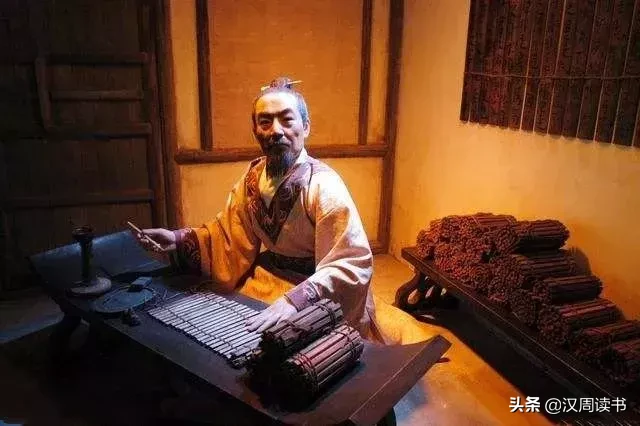
Wang Chong (王充), courtesy name Zhongren, was a famous thinker during the Eastern Han Dynasty.
Wang Chong lost his father at an early age, depended on his mother for his life, was very filial to his mother, and was praised by his neighbors, and later entered the capital Taixue and studied under the famous Confucian Ban Biao.
Wang Chong advocated the nature of life and death, advocated thin burial, opposed the induction of heaven and man, and deified Confucianism, and inherited and carried forward Lao Zhuang's Taoist doctrine, representing it as "On Balance".
Wang Chong wrote an autobiography in "On Balance", "Self-Chronicle", which described a brief history of the family and his own experience.
Wang Chongzu's ancestors had a prominent family lineage, and because of the legacy of the Yan Zhao people Shangwu Haoyong, one ancestor was awarded the title of Marquis of Yangting for military merit, lost his title and fief due to war, and later settled in Shangyu County, Huijian County, to cultivate the land and raise silkworms for a living.
Wang Chong's great-grandfather, Wang Yong, liked to be angry and could not get along with many of his neighbors.
Wang Chong bluntly described his great-grandfather Wang Yong: "Years of fierceness, cross-road wounds and killings, many grudges..."
In the year of the famine, Wang Yong blocked the road and killed people, and there were many grievances.
The world was not peaceful, and the Wang family was worried about the revenge of the enemy family, so Wang Chong's grandfather Wang Fan [fàn Tongfan] moved his family to Qiantang County to make a living by doing small business.
Wang Fan had two sons, the eldest son, Wang Meng, and the second son, Wang Shu.
Among them, Wang Shu was Wang Chong's father.
The genes of the Wang family are stronger in Wang Meng's and Wang Chen's generation, and the brothers are "brave and domineering", with their arms and strong strength, often bullying their neighbors.
The Wang brothers later formed a vendetta against the local tycoon Ding Bo and others, and had to move the family back to Shangyu.
In the third year of Jianwu (27 AD), Wang Chong was born in Shangyu.
When Wang Chong was a child, he played with his friends and did not like to fight and make trouble, other small friends liked to climb trees to catch birds and catch summer cicadas, but Wang Chong had no interest in this, and his father Wang Shu was very surprised.
When Wang Chong was six years old, he began to learn to write, knew politeness, behaved solemnly, and acted like a little adult.
For this reason, Wang Chong never suffered from his father's scolding, nor did he suffer from his mother's scolding.
When Wang Chong was eight years old, he entered the library to study, and many students were whipped by the teacher because of their poor writing, but Wang Chong's calligraphy was very good and he was never punished by the teacher.
After Wang Chong left his enlightenment teacher, he began to study the Analects and the Book of Shang, and he could recite and understand more than a thousand words of scripture every day.
Wang Chong's articles are often well received by everyone, but he never writes articles easily, and his eloquence is excellent but he rarely debates with people.
When encountering people with different ideals, Wang Chong will not say a word all day, and his remarks initially sound very strange, and after listening to them, everyone can fully understand and think that his views are correct.
Wang Chong does not seek fame and fortune, likes to talk about the strengths of others, rarely talks about the shortcomings of others, likes to hide his talents, is not willing to show off everywhere, and sells his reputation and reputation.
When the people gathered, when there was no one to talk to Wang Chong, he did not take the initiative to speak, and he could not be justified when he was slandered.
Wang Chong said that he was "happy and eager, living in poverty and tirelessly." ”
Liu Zhiji, a historian of the Tang Dynasty, looked at it and couldn't bear to look at it, and scolded bitterly: "Wang Chong's "On Heng" and "Self-Discipline" also state that his father and ancestors are not Xiao... The sinners who teach in name and the sinners who are really three thousand will be blamed! ”
Liu Zhiji believed that the reason why Wang Chong belittled his father and ancestor was to boast of himself, just like singing praises to Emperor Shun, saying that Shun's father was stubborn and stubborn, praising Dayu, and saying that Dayu's father was fierce.
Wang Chong "insulted his predecessors" in order to "be dignified to himself", and he was really a great sinner!
In fact, the reason why Wang Chong recorded the disgraceful history of his father and ancestors, in addition to the meaning of elevating himself, there is also another meaning, that is, to show that he was born very humble, belonged to the "lonely family" who "had no acre of shelter", and could have such a reputation, not by borrowing the light of his father and ancestors, but by his own efforts in the day after tomorrow.
Another point is that Wang Chong likes to be unique.
During the Han Dynasty, there were many hypocritical and hypocritical filial piety people who mixed into the official field with false names, and Wang Chong did not hide from his ancestors, but mocked the hypocritical hypocrites who were secretive for His Holiness, and deliberately did the opposite, which shows his maverick behavior and deviance.